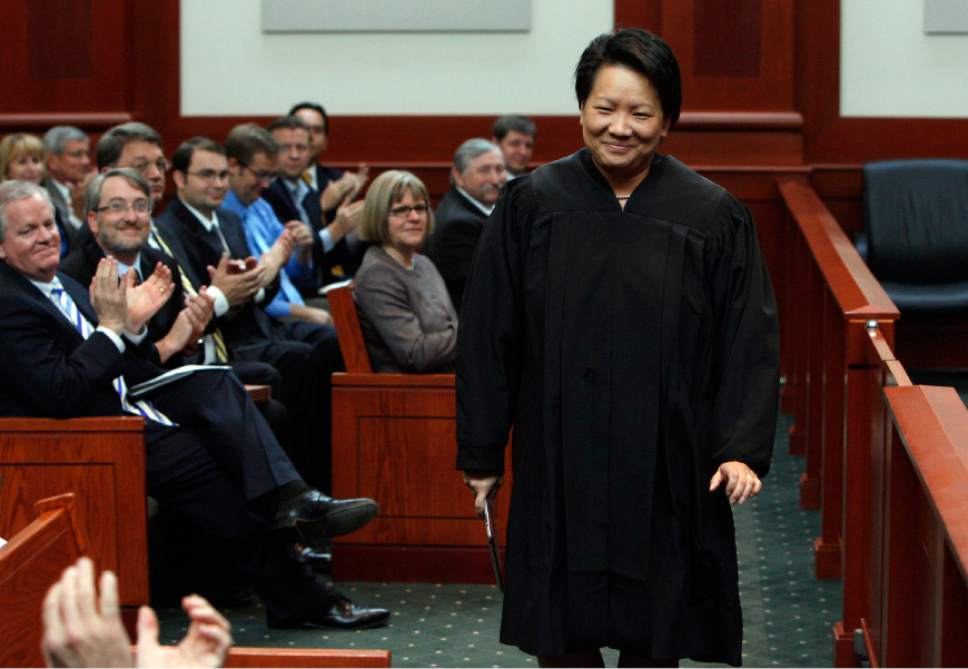This is an archived article that was published on sltrib.com in 2016, and information in the article may be outdated. It is provided only for personal research purposes and may not be reprinted.
There is a story behind the Oct. 26 op-ed piece written in The Salt Lake Tribune by Sen. Scott Jenkins, R-Plain City, that slams Third District Judge Su Chon after Chon was given a bad review by the Utah Judicial Performance Commission.
The commission recommended Chon be voted down in her retention election this year.
But Jenkins' op-ed, in which he gave himself credit for opposing Chon's nomination to the bench in the first place, has less to do with the judge and more to do with ego, grudges and political payback.
Chon, who immigrated to the United States from South Korea when she was a child, was the first minority nominated to be a judge by Gov. Gary Herbert in 2012.
Her nomination became controversial when the Senate Judicial Confirmation Committee, led by Jenkins, voted 4-2 to recommend Chon not be confirmed by the Senate.
Chon's critics, including Jenkins, said they were concerned about Chon's lack of trial experience, although there were some motivational undertones to the process, including conflicts between Herbert and some senators and Chon's experience as an attorney protecting property rights from big developers.
There are a few real estate developers in the Legislature.
The Senate slapped the confirmation committee in the face two days after the recommendation by confirming Chon 17-10.
Jenkins' op-ed, citing the commission's recommendation Chon not be retained, boasted that the committee was right and the full Senate was wrong in ignoring its recommendation.
But there was something else going on at the time that is the crutch behind Jenkins' obsession with Chon today.
Jenkins was the Senate Majority leader at the time and the right-hand man of then Senate President Michael Waddoups, who also voted against Chon in the confirmation committee.
Waddoups was retiring from the Senate that year in order to serve a mission for The Church of Jesus Christ of Latter-day Saints, and Jenkins was his handpicked successor.
Whatever Waddoups wanted, that's what Jenkins wanted. Two peas in a pod.
Because of that, Jenkins was the odds on favorite to win the leadership election that November and succeed Waddoups as Senate president.
But when Herbert's office decided not to accept the committee's recommendation to reject the governor's first minority judicial nominee and take the fight to the Senate, and when some bold senators like Curt Bramble, R-Prove, Todd Weiler, R-Woods Cross, Stuart Adams, R-Layton, and Wayne Niederhauser, R-Sandy, took the governor's side in the battle for Chon, the two sides of the conflict were defined.
And when the Senate confirmed Chon, it was a blow against the legitimacy of Jenkins as the president-in-waiting in the Senate.
"The day the Senate confirmed Chon was the day Jenkins lost the leadership election, even though that election didn't take place until three months later," said one senator.
When Jenkins lost the vote among the Republican caucus to Niederhauser, he became an angry and bitter man, said several senators.
And Niederhauser has become so popular among his peers, he doesn't even have a challenger to his leadership position in the Senate this year.
Jenkins' anger is manifest from time to time in the Senate. Recently, the Republican Senate leadership invited independent presidential candidate Evan McMullin to address the caucus during Interim Day at the Legislature.
Jenkins used an epithet to express his disgust that the caucus would allow a non-Republican to speak and then stomped out of the meeting.
For the record, the Republican caucus has had Libertarian presidential candidate Gary Johnson as a guest speaker, as well as Democrat Scott Howell, a former state senator, when he was running against Sen. Orrin Hatch a few years ago.
Jenkins also donated $2,500 to Chris Herrod when he was running against Bramble in the Republican primary this year.
Bramble won the primary anyway. Another slap in the face.
Now Jenkins apparently feels redeemed with the commission's recommendation against Chon. He and his judicial confirmation committee were right all along. And maybe he should have been elected Senate president after all.
There is one slight problem with that boastfulness.
Four other judges who were up for retention this year also were given bad reviews by the commission. And two judges up for retention two years ago were given bad reviews. But those six judges chose to retire rather than stand for re-election, and the bad reviews were never made public.
So if the judicial confirmation committee was so smart in rejecting Chon, how did it miss so badly on the other six?
Since Jenkins' op-ed panning Chon ran in The Tribune, two op-eds have appeared in the paper by separate groups of attorneys that praised Chon as a good judge and recommended she be retained by the votes.
If she prevails in the vote on Tuesday, I recommend Jenkins have a tall glass of warm milk, take a tranquilizer and enjoy a little nap. —





